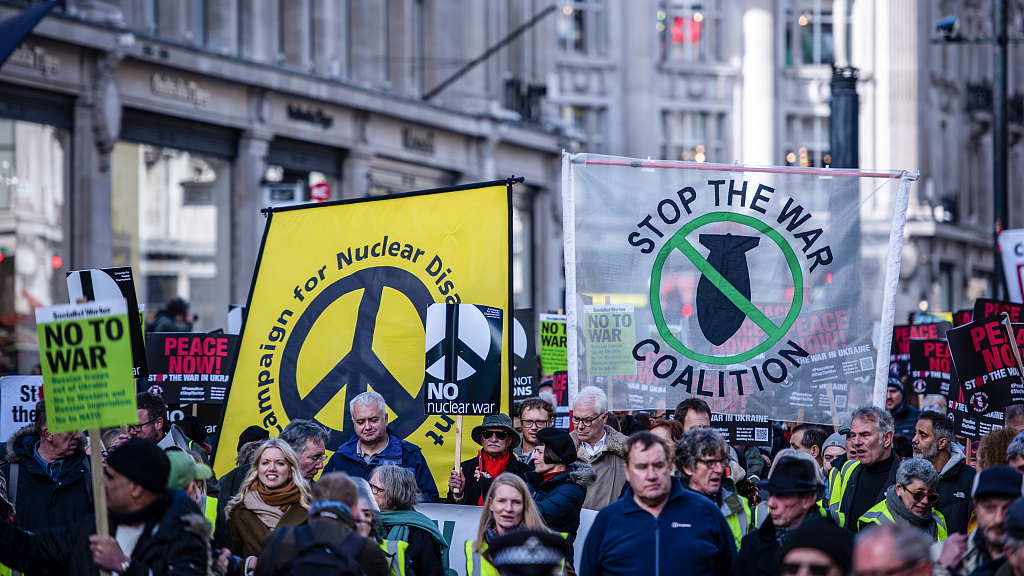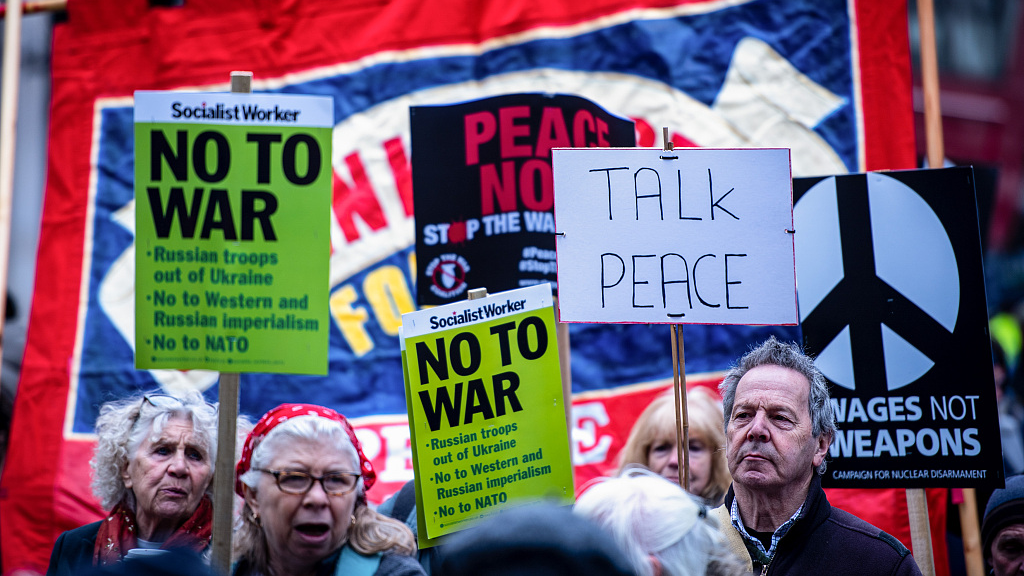
Protestors hold placards expressing their opinion during the Ukraine-Russia Conflict Anniversary Protest in London, the UK, February 25, 2023. /CFP
Protestors hold placards expressing their opinion during the Ukraine-Russia Conflict Anniversary Protest in London, the UK, February 25, 2023. /CFP
Editor's note: Imran Khalid is a freelance columnist on international affairs. The article reflects the author's opinions and not necessarily the views of CGTN.
"If all this happens, Russia will have to respond accordingly, given that the West collectively is already beginning to use weapons with a nuclear component," was the blunt reaction of Russian President Vladimir Putin to a statement given by Baroness Annabel Goldie, the UK Minister of State at the Ministry of Defense, in the House of Lords on March 20. She acknowledged that the UK would supply "armor-piercing rounds containing depleted uranium" to Ukraine with its gift of a squadron of Challenger 2 tanks because they are deemed "highly effective in defeating modern tanks and armored vehicles."
Although Putin did not elaborate how the Russians would respond to the supplies of the controversial anti-tank shells to Ukraine, Russian Defense Minister Sergei Shoigu was a little more specific and warned that there were now fewer and fewer steps left before a potential "nuclear collision" between Russia and the West. So, it shows that Moscow is taking these shells very seriously and may resort to some reaction if the UK goes ahead with its supplies to Ukraine. Not surprisingly, the UK has refuted the Russian claim about "nuclear component" and accused Moscow of intentionally spreading disinformation. They also insist that depleted uranium has been a regular component of the armor-piercing shells and equipment for decades and is being used by various militaries, including Russia, adding that it has no connection with nuclear weapons or capabilities.
Nonetheless, the UK has involuntarily ignited a new controversy. Yes, it is true that depleted uranium has been part of the armor-piercing shells for a long time, but it never became a hot topic or controversy because these shells were used in helpless and weak countries like Iraq and Yugoslavia which could not register their protest. However, this time the opponent is Russia, who is well aware of the potential hazards of these weapons and has the capacity to challenge the West.
We are witnessing a fierce controversy – probably at the right time for the wrong reasons. There are two aspects concerning the supplies of anti-tank shells laced with the depleted uranium to Kyiv: ethical (in terms of potential health hazards) and strategic (pertaining to its impact on the momentum of the ongoing conflict). Depleted uranium is a residual byproduct of the enrichment process for nuclear fuel and weapons. Its enormous density makes it an excellent material for ammunition that can penetrate through the thick armor of tanks, potentially leading to ignition of those inside. Despite being less radioactive than its naturally occurring form, there are still concerns about its toxicity.

Protestors hold placards expressing their opinion during the Ukraine-Russia Conflict Anniversary Protest in London, the UK, February 25, 2023. /CFP
Protestors hold placards expressing their opinion during the Ukraine-Russia Conflict Anniversary Protest in London, the UK, February 25, 2023. /CFP
However, it should be noted that these anti-tank rounds are also radioactive and highly toxic. There have been numerous reports linking them to a range of illnesses, including birth defects and cancers. The situation has been particularly severe in Iraq, where doctors have reported a significant increase in such conditions since the Gulf War. During the Gulf War and the Iraq War, the UK and the U.S. also utilized similar ammunitions. A recent review of studies published in BMJ Global Health has emphasized the "potential associations" between long-term health issues among Iraqis and the use of depleted uranium during these conflicts.
Pressure is also coming from non-governmental organizations working for anti-nuclear programs. The UK's decision to send ammunition has been strongly criticized by the Campaign for Nuclear Disarmament (CND), which considers it to be an "added environmental and health catastrophe for those enduring the conflict." This is due to the fact that on impact, these munitions can release toxic or radioactive dust, causing further harm. The CND has repeatedly urged the UK government to impose an immediate ban on the use of depleted uranium weapons and to finance comprehensive research into their long-term health and environmental effects. The UK is sending uranium rounds to Ukraine as the ammunition would be very effective in neutralizing the armored vehicles that Russia has deployed there.
However, as the White House and its allies are pushing to provide Ukraine with more potent weaponry, critical discussions about the unforeseen outcomes of these transfers will be catching the headlines across the globe. Apparently, Moscow will react seriously to the use of these anti-tank shells in the ongoing conflict.
Though Putin and his team have not yet put forward specifics regarding their reaction to such a scenario, two possibilities are very much apparent. One, Russia, which also possesses depleted uranium tank shells called Svinets-2, may also use these shells to target the advanced battle tanks being provided by the UK and the West. Two, as we can trace a hint from Russian defense minister Sergei Shoigu's statement, Moscow may also resort to tactical nuclear weapons to counter these hazardous but highly effective tank-busting shells. Both scenarios are dreadful and may hamper the efforts being made for a negotiated peace there.
(If you want to contribute and have specific expertise, please contact us at opinions@cgtn.com. Follow @thouse_opinions on Twitter to discover the latest commentaries in the CGTN Opinion Section.)